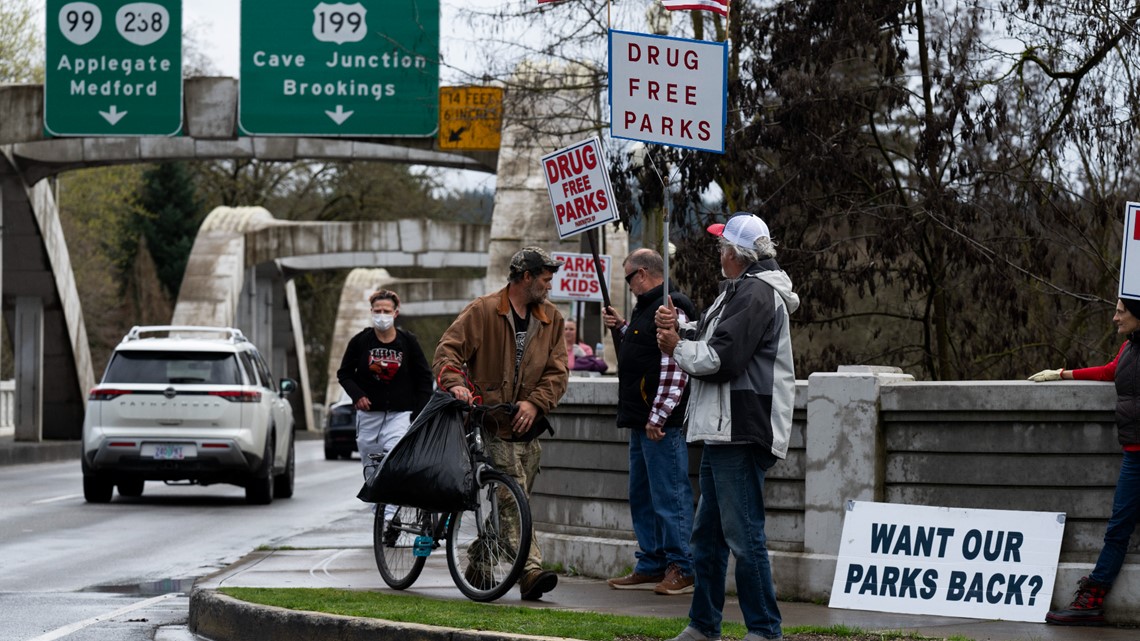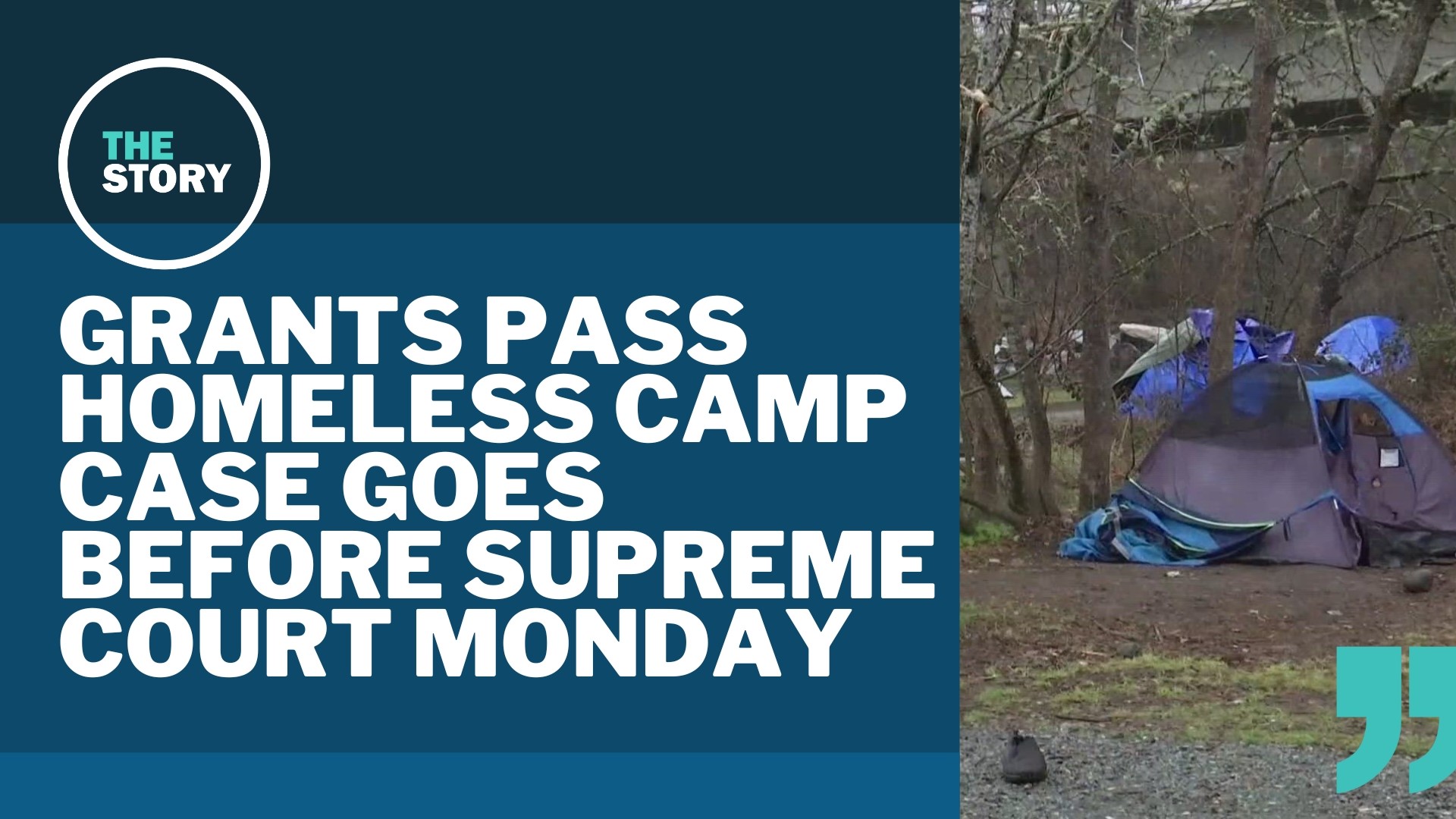WASHINGTON — Arguments are taking place Monday before the U.S. Supreme Court in a case out of Oregon that could reshape how cities enforce penalties for homeless people camping on public property through the western United States.
Johnson v. Grants Pass expanded on an earlier decision at the Ninth Circuit Court of Appeals, Martin v. Boise. The court decided that punishing homeless people with criminal or civil penalties for sleeping in public, if there is no shelter available, violates the prohibition on "cruel and unusual punishment" under the Eighth Amendment to the U.S. Constitution.
Grants Pass appealed to the Supreme Court, asking them to overturn that decision. If they do, if would free up city governments throughout the western U.S. to hand out both criminal and civil penalties to homeless people, whether there is available shelter or not.
For such a far-reaching decision, the arguments themselves are over in a flash. The Supreme Court typically hears two cases in a day while the court is in session, with each case allotted an hour for arguments. Lawyers from each side have a half hour to make their case to the justices — and most of these hearings are spent answering questions from the justices based on the briefs previously filed in the case and on past court decisions.
There will not be a decision in the case made Monday or even this week. Court opinions typically come out on the last day of the term, likely when the court recesses for the summer in late June or early July. But it's sometimes possible to determine which way the court is leaning based on the questions that justices ask.
What do the two sides say?
Though Grants Pass is the side appealing to the Supreme Court, the case originated with a group of homeless people who filed a class action lawsuit against the city over its web of ordinances. Anyone caught sleeping on the sidewalks, streets or city parks would face a fine of $295, and those fines could go up to $1,200 and 30 days in jail for repeat offenses.
The Ninth Circuit Court of Appeals ruled in favor of the homeless people, referring to the court's previous ruling in Martin v. Boise. They determined in that case that people who are involuntarily homeless can't be punished just for sleeping outside if they have nowhere else to go.
These two cases, then, became the reason why police can't arrest or cite homeless people in the western U.S. if they are committing no other crimes.
At the time, Grants Pass had virtually no adult shelters, only a transitional housing program run by a religious organization. To secure a bed, people needed to follow that organization's rules, including participating in Christian religious practices.
The attorneys for the homeless plaintiffs argue that Grants Pass wasn't simply trying to enforce some basic rules to prevent the build-up of homeless camps, but that they were trying to make it too uncomfortable for homeless people to exist in the city at all. They're able to cite past city officials who said just that.


They're also trying to hold the line, drawn by the Ninth Circuit, that Grants Pass wasn't merely punishing people for their conduct, but for their status as homeless people — an important distinction in past Eighth Amendment case law. Because the plaintiffs weren't given another option, like shelter, then they were not unsheltered in public by choice, the attorneys argue.
"Although the ordinances purport to criminalize the 'conduct' of camping, punishing homeless people for resting or sleeping outside anywhere at any time when they have no access to shelter and need a blanket to survive is not the punishment of 'conduct' in any meaningful sense of the word — it is akin to punishing the 'conduct' of breathing outside as a homeless person," the plaintiffs' attorneys wrote in a final brief.
The city of Grants Pass, on the other hand, points to the overall rise in homelessness across the West Coast and attributes it to the Ninth Circuit decisions.
"This Court can see the track record under Martin in the Ninth Circuit — sprawling encampments, rising deaths, and widespread harms to the community, as localities are forced to surrender their public spaces," city attorneys wrote.
"For the past five years, Martin has tied the hands of public officials in responding to the homelessness crisis and tasked federal judges with making difficult decisions on complex policy issues," they continued. "The Eighth Amendment supplies no workable standards to determine who is 'involuntarily' homeless, what shelter is 'accessible,' or when public camping prohibitions qualify as 'time, place, and manner' restrictions."
They go on to argue that homeless people aren't forced to sleep on public property, and that the Eighth Amendment has nothing to do with public camping laws. They assert that encampments threaten public safety with sanitation problems and fire danger.
What can we expect?
Martin v. Boise was decided back in 2018. Since then, many cities throughout the country have indeed seen a dramatic rise in unsheltered homelessness. According to constitutional law professor Norman Williams of Willamette University, this could partially explain why the high court decided to take on the Grants Pass case when they previously passed on Boise. The court has also gotten decidedly more conservative in the intervening years.
"Overall, I'm fully expecting the Supreme Court to side with Grants Pass here," Williams said. "I think the U.S. Supreme Court — not to put too fine a point on it — a court that Is unwilling to say the Constitution protects a woman's right to choose is going to be even more hostile to the notion that the Constitution protects the right to be homeless or to camp in public parks. So I think the court took this case precisely with an eye to reversing the Ninth Circuit decision."
There's also the huge upsurge in interest for this case. Dozens of parties have submitted amicus curiae or "friend of the court" briefs, many of them backing Grants Pass in its bid to overturn the ruling. And the case has produced some strange bedfellows, including California Gov. Gavin Newsom and the conservative Goldwater Institute, not to mention the attorneys general of Idaho, Montana, Nevada and other western states.
The League of Oregon Cities, notably including Portland, has also weighed in on behalf of Grants Pass.
Williams said that those briefs are another major reason why the Supreme Court decided to hear this case.
"What's really striking is how many states, how many counties, how many cities here on the West Coast — governments run by liberal Democratic mayors and governors — have filed briefs with the court saying that 'This is unworkable,'" Williams said, "that allowing for the homeless to have a constitutional right to sleep in public parks, to sleep on sidewalks, even in streets is only hampering the ability of state and local government to develop a comprehensive solution to homelessness.
"And I think those briefs will resonate with the U.S. Supreme Court, which will view this problem of homelessness as one best left to the political process and for experimentation in public policy solutions, rather than as, in some sense, being restricted by the Eighth Amendment's cruel and unusual punishment clause of taking away one of the tools that state and local governments have used to deal with this problem."
When it comes to that 8th Amendment argument that the Ninth Circuit court took up, Williams said he thinks the court will decide that fining and jailing people for sleeping outside isn't cruel and unusual enough.
"The Eighth Amendment's cruel and unusual punishment clause speaks of punishment ... It's really there to address torture, capital punishment," he said. "It's not there to address what type of conduct can be criminalized in the first place.
"The Ninth Circuit proceeded on the assumption here that any fine, any jail time would itself be cruel and unusual if you were involuntarily homeless, if there were no shelter beds available within the city — which was the case in Grants Pass, in the Ninth Circuit's view. Grants Pass (asks), as it has emphasized in its brief to the court, is a very small fine applicable to this? It only jails individuals who have been repeatedly found to have violated the city camping statutes, and Grants Pass emphasized that it issued fewer than 100 citations per year."
Ashley Koch of KGW contributed to this article.

